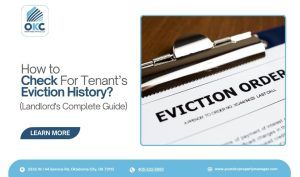Finding the right tenant can make or break your rental business success. A trustworthy renter pays rent on time, takes care of your property, and follows the lease terms. On the other hand, one bad tenant can lead to unpaid rent, property damage, or even legal issues.
That’s why knowing how to run a background check on tenants is one of the smartest steps any landlord or property manager can take. A proper tenant screening process lets you verify a renter’s identity, financial stability, and rental history before signing a lease. This helps you make informed decisions and reduce risks.
With more than 15 years of experience managing rental properties across Oklahoma City, Edmond, Moore, Norman, Yukon, and surrounding areas, I’ve learned that a thorough background check can prevent costly evictions and protect your investment. Whether you manage properties yourself or work with a professional property management company in Oklahoma, understanding how to screen tenants correctly is key to ensuring consistent rental income and long-term success.
Why Tenant Background Checks Matter
Before you sign a lease, you need to understand who you’re renting to. A tenant background check is a vital screening process landlords use to verify an applicant’s or tenant’s creditworthiness, identity verification, rental history, criminal background, and income stability. It helps determine whether a prospective tenant is likely to pay rent on time, maintain the property, and follow lease terms responsibly.
1. Protecting Your Property and Income
Conducting a tenant background check safeguards your property and financial security. It helps you identify applicants who may pose risks such as missed rent payments, property damage, or potential evictions. By screening tenants before approval, you protect your investment, ensure consistent cash flow, and gain peace of mind knowing your property is in responsible hands.
2. Reducing Turnover Costs
Frequent tenant turnover can drain time and resources. Evictions, repairs, and re-advertising add up quickly. Running thorough background checks helps you find dependable, long-term renters who respect your property and fulfill their lease commitments. This proactive approach minimizes costly vacancies and reduces turnover expenses over time.
3. Ensuring Legal Compliance
In Oklahoma, landlords must follow Fair Housing laws and the Fair Credit Reporting Act (FCRA) when screening tenants. Maintaining a consistent and transparent screening process helps ensure your rental practices meet both state and federal requirements. Compliance not only protects you from legal issues but also promotes fairness and trust in your rental business.
What Does a Rental Background Check Include?
A rental background check goes beyond a simple credit inquiry. It provides a complete picture of a tenant’s reliability and financial stability. Here’s what a typical tenant background check includes:
1. Credit Report
A tenant’s credit report reveals their financial responsibility through payment history, credit score, and outstanding debts. Landlords should look for consistent on-time payments, low credit utilization, and the absence of recent bankruptcies. These details help determine whether an applicant can manage rent payments responsibly.
2. Criminal Background Check
A criminal background check uncovers any state or federal convictions linked to the applicant. In Oklahoma, landlords can access records through state court databases or use professional screening services for nationwide searches.
Important: Do not reject applicants solely based on arrests without convictions, as this may violate Fair Housing laws. Always apply consistent screening criteria to every applicant to ensure fairness and compliance.
3. Eviction History
An eviction history report reveals whether the tenant has previously been evicted. Landlords in Oklahoma can review public court records from counties such as Oklahoma and Cleveland or use trusted screening platforms like TransUnion SmartMove or RentPrep. Past eviction patterns often indicate potential future payment issues or lease violations.
4. Employment and Income Verification
Verifying a tenant’s income ensures they can comfortably afford rent payments. Request pay stubs, W-2 forms, bank statements, or contact their employer directly. A reliable guideline is that a tenant’s monthly income should be at least three times the rent amount. This verification step safeguards landlords from potential non-payment risks.
5. Rental History
Reaching out to previous landlords offers valuable insight into the applicant’s rental behavior. Ask about rent payment consistency, adherence to lease terms, and the property’s condition at move-out. These firsthand accounts often reveal more about a tenant’s reliability than credit or background data alone.
Legal Requirements for Tenant Screening in Oklahoma
When running a background check for renters, you handle personal data protected by law. Oklahoma landlords should know the following regulations:
1. Fair Credit Reporting Act (FCRA)
The FCRA regulates how landlords can obtain and use credit and background reports for tenant screening.
Key requirements:
- Obtain written consent from the applicant.
- If denying based on the report data, issue an adverse action notice.
- Keep all tenant data secure and confidential.
2. Oklahoma Landlord-Tenant Act
This act supports fair and consistent treatment of all applicants. Always use the same standards for every tenant background search to avoid discrimination.
When screening potential tenants in Oklahoma, landlords must follow state and federal laws that protect applicants’ personal information. Understanding these legal obligations helps ensure compliance and prevents costly disputes.
3. Fair Housing Compliance
Federal law prohibits discrimination based on race, religion, sex, national origin, familial status, or disability. Avoid questions that could violate these protections during your tenant verification process.
Step-by-Step Guide: How to Run a Tenant Background Check
A tenant background check is one of the most effective ways to find reliable tenants and protect your rental investment. Here’s how to do a proper background check the right way to make confident, informed decisions and welcome the right renters into your property.
Step 1: Get Written Authorization
Always obtain signed consent before running any tenant credit and background check. This is required under the FCRA.
Step 2: Collect Tenant Information
Ask applicants to complete a rental application including:
- Full name and date of birth
- Social Security number
- Current and previous addresses
- Employment information
Step 3: Choose a Reliable Screening Platform
Select an FCRA-compliant, Comprehensive data (credit, criminal, eviction), Transparent pricing, Easy-to-read reports, and Fast turnaround tenant screening service. The best tenant screening services for small landlords and property managers include:
- TransUnion SmartMove
- RentPrep
- Avail
- Buildium
- Experian Connect
If you prefer not to manage this yourself, property management firms like OKC Home Realty Services in Oklahoma City handle background and credit checks for tenants using trusted tenant screening systems on your behalf across Edmond, Moore, Yukon, Midwest City, Del City, Mustang, Norman, and Guthrie.
Step 4: Run Credit, Criminal, and Eviction Reports
Use your chosen platform to order the full tenant screening report. Review details like:
- Credit score trends
- Eviction records
- Criminal convictions
- Employment and address consistency
Step 5: Verify Income and Employment
Contact employers or request proof of income. This step helps confirm rent affordability and prevents fraudulent applications.
Step 6: Contact Previous Landlords
Ask about rent payment history, property care, and lease compliance. Authentic references reveal how a tenant may treat your property.
Step 7: Evaluate Fairly
Use a consistent checklist for every applicant. If you deny someone, follow adverse action notice procedures to stay compliant.
How to Read Tenant Background Check Results
Once you receive the tenant screening report, here’s what to look for:
Credit Score Guide
- 700+ (Excellent): Low-risk tenant
- 650–699 (Good): Reliable with minor issues
- 600–649 (Fair): Moderate risk, review closely
- Below 600: Potentially risky, evaluate context
Common Red Flags
- Unpaid accounts or collection notices
- Multiple evictions
- Frequent job changes
- Unverifiable income
- Inconsistent rental references
Always assess the complete picture; one late payment doesn’t define a tenant’s reliability.
Common Mistakes in Tenant Screening
Avoid these errors when conducting a background check for rental applications:
- Running checks without written consent
- Ignoring FCRA notice requirements
- Changing the screening criteria between applicants
- Focusing only on credit scores
- Skipping employment or landlord verification
Consistency and documentation protect you from discrimination claims and poor tenant choices.
How Property Managers Simplify Tenant Screening
A property management background check process saves landlords time and ensures compliance.
Benefits of Working with Property Managers:
- Access to verified tenant screening systems
- Legal protection under fair housing rules
- Consistent, data-driven evaluations
- Faster tenant placement
At OKC Home Realty Services, our tenant background and credit check process includes:
- Pre-qualification and income verification
- Nationwide eviction, criminal, and credit screening
- Prior landlord reference calls
This proven method helps Oklahoma landlords find respectful tenants who pay on time.
Tenant Screening in Oklahoma’s Rental Market
Oklahoma’s growing rental market, especially in Oklahoma City, Edmond, Del City, and Norman, means landlords face more competition and more applicants. Reliable background checks for tenants make it easier to choose high-quality renters.
Local insights:
- Oklahoma eviction records are publicly accessible online.
- Tenant affordability ratios (rent-to-income) remain favorable statewide.
- Military and student renters near Tinker AFB and OU Norman often require tailored tenant screening criteria.
Final Thoughts: Renters Background Check
A detailed tenant background check is one of the most effective tools to protect your property, income, and peace of mind. By using an FCRA-compliant process and local landlord-tenant law, you’ll attract responsible renters and avoid costly turnover or eviction.
If the process feels time-consuming, let the experts handle it.
OKC Home Realty Services provides complete tenant screening and property management services across Oklahoma City, Edmond, Moore, Norman, Yukon, and Midwest City. We handle everything, from credit and background checks to lease signing, so you can rent with confidence.
Disclaimer: This article is for informational purposes only and is not legal advice.
FAQs: Tenant Background Checks in Oklahoma
How much does a tenant background check cost in Oklahoma?
Most rental background checks cost between $25–$50 per applicant, depending on the level of detail.
Can a landlord run a background check without consent?
No. Under the FCRA, landlords must obtain written permission before accessing any credit or background data.
What’s a good credit score for renting in Oklahoma?
A credit score of 650+ is typically considered good, though landlords may approve lower scores with strong income or references.
How long does a rental background check take?
Most tenant screening reports are ready within a few minutes to 24 hours, depending on the provider.
Do property managers handle background checks?
Yes. Professional property managers like OKC Home Realty Services include tenant background and credit checks in their tenant placement and management services.
Can landlords deny tenants based on bad credit?
Yes, but you must issue an Adverse Action Notice and ensure your decision is consistent with your stated screening criteria.
Are criminal background checks allowed in Oklahoma?
Yes, but you must consider the nature, severity, and recency of offenses and comply with Fair Housing laws.
How far back do background checks go in Oklahoma?
Most reports go back 7–10 years, depending on the type of record.
What happens if a tenant lies on the rental application?
Providing false information can be grounds for denial or lease termination, depending on the situation.
Can tenants see what's on their screening report?
Yes. Under the Fair Credit Reporting Act (FCRA), tenants have the right to request and review a copy of their screening report from the reporting agency.
Can applicants reuse their own background check?
Sometimes, but it depends on the landlord or property management company. Most landlords prefer to run their own background checks to ensure the information is current, complete, and verified directly through an approved screening service.

Author
Scott Nachatilo is an investor, property manager and owner of OKC Home Realty Services – one of the best property management companies in Oklahoma City. His mission is to help landlords and real estate investors to manage their property in Oklahoma.
 (
(









